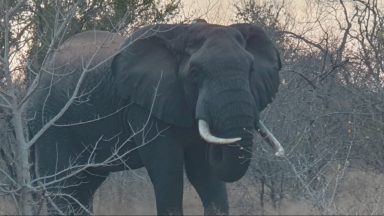In March this year, Peace Parks Foundation celebrated the natural migration and arrival of two packs of African wild dogs in Limpopo National Park in Mozambique. The presence of apex predators, like African wild dogs, in a landscape is an indicator of a healthy landscape, and with the two packs moving intuitively into the region, it was a signal of the success of many years of conservation efforts to revive the park.
Further down south in Mozambique, Peace Parks Foundation has been assisting Mozambique’s National Administration for Conservation Areas (ANAC) to restore and rewild Maputo National Park for more than a decade. This remarkable park is considered one of the most biologically diverse and endangered ecoregions on Earth. A successful rewilding programme means the park now boasts an animal population of 12,300, a testament to impactful ecological management and protection of wildlife and their habitats. While the arrival of African wild dogs in Limpopo National Park was exciting, spotting a pack of nine wild dogs in Maputo National Park required more caution and delicate handling.
Wild dogs are an endangered species. With less than 700 packs believed to be in the wild throughout sub-Saharan Africa, protecting them is vital for their survival. Living in packs averaging from seven to 15 members, wild dogs are extremely sociable animals and cooperative hunters, also raising young pups collaboratively. They are prolific apex predators, using incredible teamwork tactics and reaching speeds of up to 55 km/h to chase down prey ranging from rodents and birds to warthogs and large antelope. There is little wonder that they play a pivotal role in maintaining healthy ecosystems.
As they are prolific hunters, the wild dogs pose a threat to a healthy ecosystem balance in the park. With the ongoing rewildling efforts here, Mozambique’s National Administration for Conservation Areas and Peace Parks took the proactive decision to track down the dogs and relocate them to protect both the animals and the ecosystems they rely on.
In this video, we follow a dedicated team, including technical advisors, field rangers, wildlife vets, and helicopter pilots, that is attempting to dart the pack of wild dogs as part of their relocation. The operation requires coordination on the ground and in the air, phenomenal flying skills, and meticulous darting capabilities.
The team manage to dart and locate two individuals from the pack, but the bushveld forest landscape and the dexterity and pace of the dogs are testing the skills of the team. In Part 2 of this series, we find out whether the team is successful in completing the operation. Stay tuned to PeaceParks.TV on your favourite social media channel to follow this exciting conservation story unfolding in Maputo National Park!

